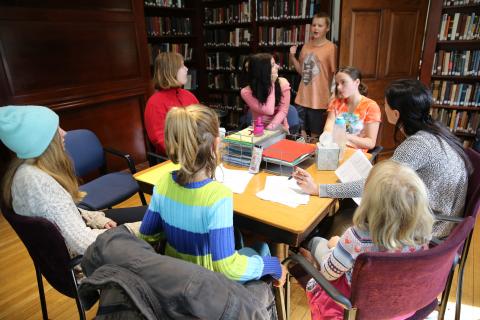During this holiday season, my daughter gave each of her SVS friends pillow cases. Using a fabric marker, each pillow case was emblazoned with a block of text. Then each pillow case was rolled up like a scroll and tied with a ribbon. The result looked like they might contain great wisdom from antiquity. But the Sudbury Valley School (SVS) is only 50 years old, and each pillow case was emblazoned with a rule from the SVS Lawbook.
There are several hundred discrete numbered rules in the SVS Lawbook. A copy of which is mailed to each family as part of the annual enrollment process. Though collectively I find them very interesting, individually they can make for some rather dry reading. A couple years ago, in order to better my understanding of how SVS works, I read the Lawbook cover to cover.
Some rules are amusing in their simplicity:
300.045 Paper airplanes at school must be clearly marked with their owner’s name.
While others reveal great complexity and sophistication for example:
2952.03 removal from office
Which outlines the mechanism by which elected School Meeting officials may be impeached. This rule is several paragraphs long.
The SVS Lawbook is the Magna Carta, Declaration of Independence, the Constitution and the Bill of Rights all rolled up into one document. It is a dynamic document, the weekly School Meeting frequently votes on new rules, changes to existing rules and the removal of rules. In total the Lawbook defines a sophisticated and complex system that collectively define governance at SVS.
How does this system perpetuate itself? How in a school where, by design, students are not required to study any particular subject, class or document, do SVS students learn the complexities of their own school’s legal and decision-making system?
The U.S. legal system is and has always been sufficiently complex such that many legal matters need to be handled by lawyers with special training to understand the legal system of the United States. But at SVS each student if expected to be able to navigate the school’s legal system more or less on their own. Like many things at SVS they can ask staff or other students for advice or assistance. But there are no “lawyers” at SVS that students can hire when they need legal help. The closest thing remotely analogous to a lawyer is the elected “Law Clerk” who in addition to maintaining the Lawbook as changes are made, can also advise the Judiciary Committee regarding “the contents of the lawbook and the various interpretations thereof.” (3140.032)
So, the Law Clerk is expected to be facile with all the school’s rules, and like me has probably read it cover to cover. But how does the rest of the SVS student body assimilate to the SVS legal system? I am sure each student’s journey from knowing nothing about how the school works, to understanding and identifying themselves as part of a working decision making and legal system, which they control, is unique.
Having watched my two daughters and their friends at SVS for a number of years, I believe a major impetus for learning the school’s systems results from hands on experience. If you enjoy crafts, you learn that there is an SVS Arts & Crafts Corporation that makes decisions about supplies and tools. The school’s legal system, the Judiciary Committee (JC), touches everyone in the school. With hundreds of complaints investigated each year, students are likely to have regular interactions with that part of the school. Students can either file complaints, have complaints filed against them, serve as a randomly chosen JC member, or testify as part of an investigation. Even if a particular student has had no direct interaction, its likely their friends have, and they talk about it together.
Children are naturally curious about “how things work”. Once they learn that they are not subject to arbitrary and capricious decisions made from on high, their curiosity about how it all works may lead them to attend School Meetings, read JC decisions, run for office or perhaps even read the Lawbook!
I admit that my daughter might be a little extreme in her engagement with the Lawbook. But her choice of pillow cases emblazoned with rules from the SVS Lawbook as holiday gifts hints at the degree to which students come to identify with and participate in the workings of the community’s democratic and legal processes.
This year consider giving your child a chance to experience the rich and democratic “rule of law” as it exists at the Sudbury Valley School. Visit the school at their next open house.


